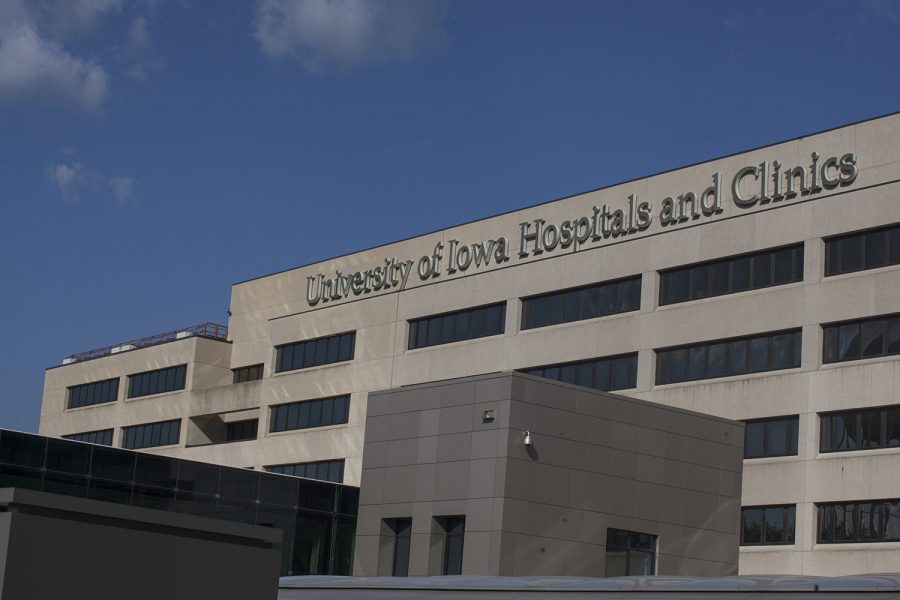Johnson County hospitals on ‘high alert’ for potential uptick in COVID-19 cases
Johnson County hospitals are still preparing for potential influx of COVID-19 patients. They’re also waiting for confirmation from the state on vials of remdesivir, an antiviral drug the University of Iowa Hospitals and Clinics studied as part of an international clinical trial.
University of Iowa Hospitals and Clinics as seen on Sept. 17, 2018.
May 12, 2020
Hospitals in Johnson County are putting in safeguards in the case of new waves of novel coronavirus patients, and taking steps to access new treatments for COVID-19.
Business closures in Iowa are set to expire Friday night, and Iowa Gov. Kim Reynolds said she would announce an update to those guidances on Wednesday. Over the weekend, campgrounds, tanning facilities, and shopping malls were allowed to reopen statewide with additional public health precautions.
Mercy Iowa City Public Information Officer Margaret Reese said the hospital has restarted elective surgeries and has taken other steps to resume hospital business, but that Mercy doesn’t anticipate COVID-19 to go away anytime soon.
“We are on high alert for potential surges, whether that would be one large surge or that would be a periodic occurrences of higher volumes of patients with COVID-19, until there is a reliable vaccine — and we don’t know how long that might be — this is something that we have to all live with.”
Mercy had five COVID-19 inpatients as of Tuesday.
University of Iowa’s Chief Medical Officer Theresa Brennan said during a Tuesday press conference that people should still adhere to physical distancing guidelines and mask-wearing as businesses prepare to open.
“I’m hearing and seeing in the community that there may be a perception that we’re through this,” Brennan said. “…I think it’s really important that as the governor opens up the state and as people venture out into the community…that they take those precautions. Those precautions are going to be with us for a while and it’s really important that we continue to to abide by them.”
UIHC and other area hospitals are also making advancements in new treatments and testing for the virus.
Both hospitals have applied to receive remdesivir, a medication recently approved by the FDA that can be used in adults and children suffering from severe COVID-19 cases, from the state. Iowa Public Health Department Deputy Director Sarah Reisetter said the State Hygienics Lab would distribute 400 vials of the anti-viral drug to Iowa hospitals depending on the number of hospitalized and ICU patients, trends in disease activity, and the availability of necessary equipment. Reisetter said the drug must be administered by health-care professionals.
Neither Reese nor Brennan knew whether their hospital would be approved for the state’s supply as of Tuesday. UIHC, however, participated in an international clinical trial of the antiviral drug.
Brennan said that the principal investigator on the trial, Dilek Ince, clinical associate professor of internal medicine, has been coordinating with state agencies and other area hospitals that’ve also delivered remdesivir to their patients to create guidelines outlining how to deliver remdesivir.
Brennan said it was hard to know yet whether those who took remdesivir as part of the international trial UIHC participated in recovered more quickly than those who took a placebo. The trial was not randomized, and patients only took part in the trial after discussions with their doctor. Not all cases were sever, she said.
“I can tell you that our survival rates have been better here than expected, and better than what we’re hearing about nationally,” Brennan said, referring to UIHC’s cases overall.
UIHC currently is treating 24 patients, bringing their to-date total up to 161 COVID-19 patients treated, Brennan said.
She said patients have recovered after being on ventilators, ECMO, a machine that assists the heart and lungs for very ill patients, and patients with significant respiratory distress have recovered on prone ventilation, when a person is lying chest down.
Researchers at UIHC have not yet started widespread serology testing, Brennan said, which tests whether people have coronavirus antibodies and indicates whether people had the virus and didn’t know it. Those tests will be important for eventual convalescent plasma treatments, Brennan said, which involve taking the blood from a recovered COVID-19 patient and giving those antibodies to someone who is sick.
Brennan said UIHC does have the serology testing equipment on site, but that the first wave of testing would likely come through a research trial.
“We have at least one trial on the horizon for that,” Brennan said.
For the convalescent plasma treatment, Brennan said that they’d identified about 40 donors and 40 recipients and had delivered just over 30 treatments. She added that patients could choose between participating in the plasma trial or the remdesivir trial.



